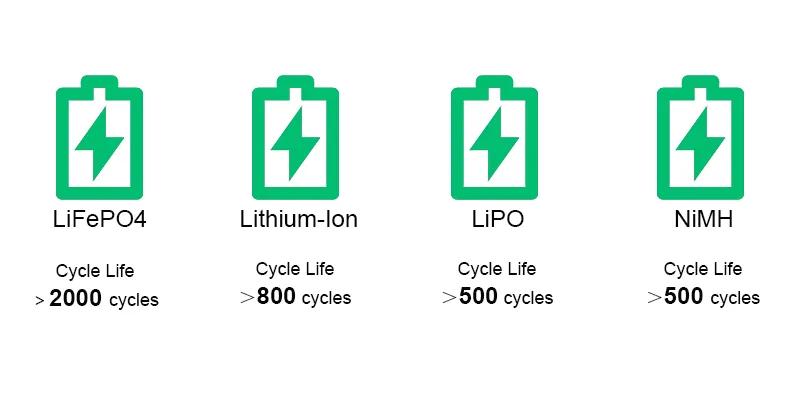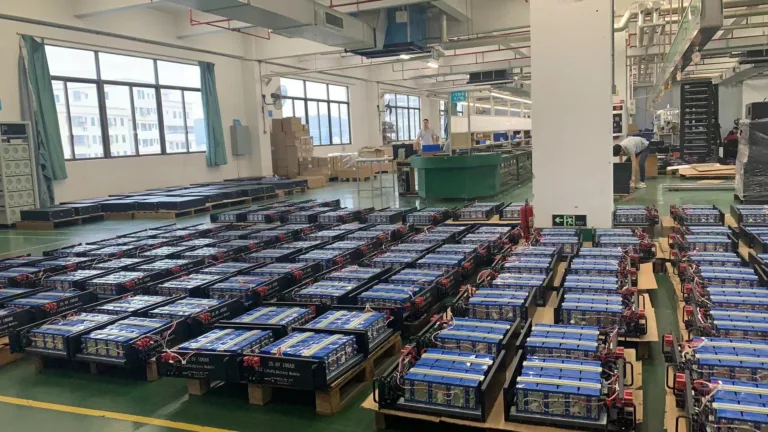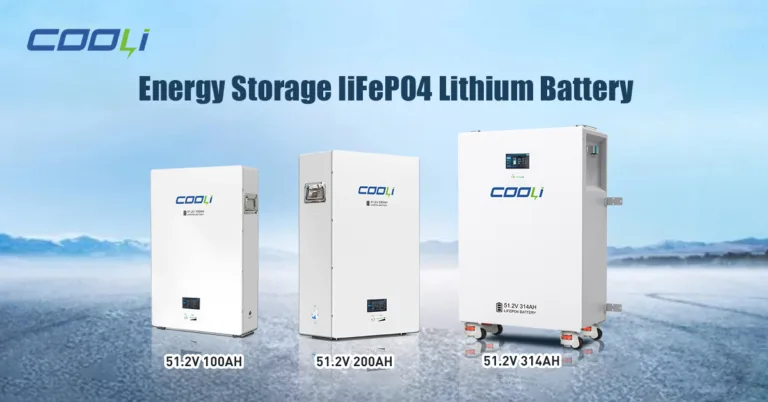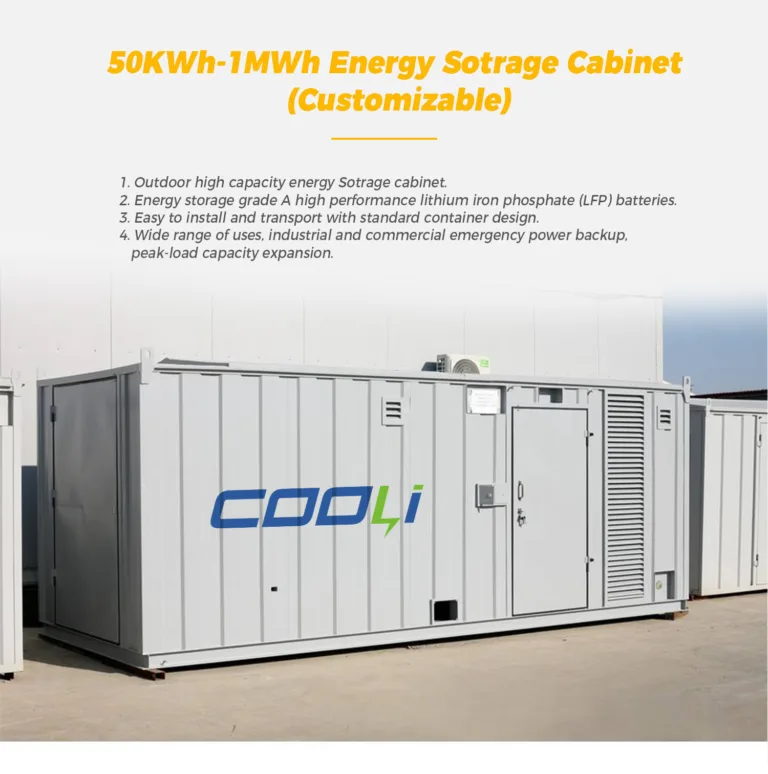LiFePO4 Battery vs. Lithium-Ion: A Comprehensive Guide
When choosing between LiFePO4 (Lithium Iron Phosphate) and lithium-ion (Li-ion) batteries, understanding their differences is critical for optimizing performance, safety, and cost. This guide breaks down their chemistry, advantages, limitations, and ideal applications to help you make an informed decision.

What is a LiFePO4 Battery?
LiFePO4 batteries are a subtype of lithium-ion batteries that use phosphate-based cathodes (LiFePO₄) instead of cobalt or nickel-based materials like traditional Li-ion batteries. This unique chemistry grants them exceptional thermal stability, safety, and longevity.
Advantages of LiFePO4 Batteries
1. Superior Safety
LiFePO4 batteries are resistant to thermal runaway, a dangerous chain reaction causing fires in conventional Li-ion batteries. Their stable chemical structure minimizes overheating risks even under extreme conditions.
2. Longer Lifespan
With 2,000–5,000 charge cycles (vs. 500–1,000 for Li-ion), LiFePO4 batteries excel in applications requiring frequent cycling, such as solar energy storage or electric vehicles.
3. Environmental Friendliness
They use non-toxic materials (iron, phosphate) and are easier to recycle compared to cobalt-dependent Li-ion batteries.
4. Wide Temperature Tolerance
LiFePO4 operates efficiently in -20°C to 60°C ranges, outperforming Li-ion’s narrower 0°C to 45°C tolerance.
5. Cost-Effectiveness Over Time
Though pricier upfront, their long lifespan reduces replacement costs. For example, a LiFePO4 battery’s lifetime cost is 80–200/kWh∗∗vs.Li−ion’s∗∗80–200/kWh∗∗vs.Li−ion’s∗∗300–600/kWh.
Downsides of LiFePO4 Batteries
1. Lower Energy Density
LiFePO4 stores 90–120 Wh/kg, less than Li-ion’s 150–250 Wh/kg, making them bulkier for high-energy applications like smartphones.
2. Higher Initial Cost
Their advanced chemistry raises upfront costs, though this is offset by long-term savings.
3. Limited High-Power Performance
Lower discharge rates make them less ideal for applications needing rapid energy bursts, such as power tools.
LiFePO4 vs. Lithium-Ion: Key Comparisons
| Metric | LiFePO4 | Lithium-Ion |
|---|---|---|
| Cycle Life | 2,000–5,000 cycles | 500–1,000 cycles |
| Energy Density | 90–120 Wh/kg | 150–250 Wh/kg |
| Safety | Minimal thermal runaway risk | Higher risk with cobalt-based designs |
| Temperature Range | -20°C to 60°C | 0°C to 45°C |
| Cost (Lifetime) | Lower | Higher |

Do LiFePO4 Batteries Last Longer?
Yes. LiFePO4’s robust chemistry enables 3–5× longer lifespans than Li-ion. Proper maintenance, such as avoiding deep discharges (>80% DoD) and extreme temperatures, can further extend their life.
Which Lithium Battery Lasts the Longest?
LiFePO4 batteries hold the crown for longevity, with up to 5,000 cycles under optimal conditions. In contrast, lithium cobalt oxide (LCO) or nickel-manganese-cobalt (NMC) Li-ion batteries degrade faster due to chemical instability.
Can You Charge LiFePO4 with a Li-ion Charger?
Not recommended. LiFePO4 requires a lower charge voltage (3.6–3.65V per cell) vs. Li-ion’s 4.2V. Using a mismatched charger risks undercharging or damaging the battery. Always use a LiFePO4-specific charger for safety and efficiency.
Conclusion: Is LiFePO4 Better Than Lithium-Ion?
LiFePO4 shines in safety-critical, long-cycle applications like solar storage, EVs, and industrial equipment. However, traditional Li-ion remains superior for high-energy, compact devices like laptops. Your choice depends on prioritizing lifespan and safety versus energy density.
For tailored solutions, explore our recommended LiFePO4 products here or consult experts for custom needs.
Explore More:
5kWh LiFePO4 Battery in Vietnam 10kWh Energy Storage Solutions for Yemen 15kWh LiFePO4 Solar Storage 15kWh Solar Battery 24V vs 48V Lithium Battery 48V Lithium Batteries 51.2V 200Ah 10kWh Battery 51.2V 200Ah LiFePO4 Batteries Wholesale 150kW Solar System 300Ah 51.2V Floor Standing Battery Battery IP Ratings battery manufacturer in China Best LiFePO4 Batteries Engineered for Middle East Desert Best Lithium Battery in Pakistan Bulk Buy Home ESS China Sourcing Tips China’s Top Battery Manufacturer Custom Household Batteries Direct Factory Custom Lithium Batteries Depth of Discharge (DoD) energy storage battery Grade A Battery home energy storage Lead-Acid to Lithium LiFePO4 batteries LiFePO4 Batteries in Australia LiFePO4 Batteries in the Philippines LifePo4 battery LiFePO4 Battery Manufacturers LifePO4 Battery Technology LiFePO4 Battery vs. Lithium-Ion LiFePO4 vs NMC Home ESS Lithium Batteries in Solar Systems Lithium Battery Manufacturer Lithium Battery Safety Tips lithium ion battery Market Trends Off-Grid Solar Batteries for European Homes Reliable Home Battery Bulk Suppliers Solar Batteries in Syria Solar Panel solar system Top 10 Home Battery Alibaba Suppliers Verified Wall-Mounted Lithium Batteries Wall vs Rack Batteries







Un comentario